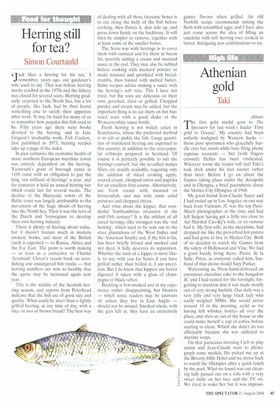Herring still for tea?
Simon Courtauld
crack likes a herring for his tea,' I J remember, years ago, our gardener's wife used to say. That was before herring stocks crashed in the 1970s and the fishery was closed for several years. Herring gradually returned to the North Sea, but a lot of people. like Jack, had by then found something else to satisfy their appetites after work. It may be hard for many of us to remember how popular this fish used to be, Fifty years ago there were books devoted to the herring, and in Jane Grigson's invaluable work, Fish Cookery, first published in 1973, herring recipes take up a page of the index.
In past centuries the economic health of many northern European maritime towns was entirely dependent on the herring. Yarmouth's grant of borough status in 1108 came with an obligation to pay the king 'ten milliard of herrings' a year, and for centuries it held an annual herring fair which could last for several weeks. The decline of the Hanseatic towns of the Baltic coast was largely attributable to the movement of the huge shoals of herring into the North Sea. Then it was the turn of the Dutch and Norwegians to develop their own herring industry.
There is plenty of herring about today, but it doesn't feature much in modern cookery books, and most of the British catch is exported — to Russia, Africa and the Far East. The point is worth making — at least as a corrective to Charles 'Jeremiah' Clover's recent book on overfishing and endangered fish stocks — that herring numbers are now so healthy that the quota may be increased again next year.
This is the middle of the Scottish herring season, and reports from Peterhead indicate that the fish are of good size and quality. What could be nicer than a lightly grilled herring, at any time of day, with a slice or two of brown bread? The best way of dealing with all those tiresome bones is to cut along the belly of the fish before cooking, then flatten it. skin side up, and press down firmly on the backbone. It will then be simpler to remove, together with at least some of the smaller bones.
The Scots way with herrings is to cover them with oatmeal and fry them in bacon fat, possibly adding a cream and mustard sauce at the end. They may also be rubbed before cooking with mustard powder or made mustard and sprinkled with breadcrumbs, then basted with melted butter. Some recipes advise making a sauce with the herring's soft roes. This I have not tried, but the roes are delicious on their own, poached, fried or grilled. Chopped parsley and cream may be added, but the important thing is to eat them on hot buttered toast with a good shake of the Worcestershire sauce bottle.
Fresh herring is not widely eaten in Scandinavia, where the preferred method is to salt or pickle the fish. Large quantities of marinated herring are exported to this country, in addition to the ever-popular rollmops prepared in Scotland. Of course it is perfectly possible to salt the herrings yourself, but the so-called matjes fillets are readily available, requiring only the addition of sliced cooking apple, soured cream, chopped onion and paprika for an excellent first course, Alternatively, use fresh cream with mustard or horseradish, and mix with some salad potatoes and chopped chives.
And what about the kipper, that wonderful Northumbrian invention of the mid-19th century? It is the mildest of all cured herrings (the strongest was the 'red herring', which used to be sent out to the slave plantations of the West Indies and the American South) and, if the fish is fat, has been briefly brined and smoked and not dyed, it fully deserves its reputation. Whether the taste of a kipper is more likely to stay with you for hours if you have grilled rather than boiled it, I am uncertain. But I do know that kippers are better digested if taken with a glass of champagne or black velvet.
Buckling is hot-smoked and in my experience rather disappointing, but bloaters — which some readers may be unaware of, unless they live in East Anglia — should not be missed. Smoked whole, with the guts left in, they have an attractively
gamey flavour when grilled. An old Norfolk recipe recommends mixing the flesh with scrambled eggs; and I have also just come across the idea of filling an omelette with soft herring roes cooked in butter. Intriguing new combinations to try.


























































 Previous page
Previous page